

Jenny Slate is peering at a breakfast menu, methodically poking and prodding her stomach with both hands. She catches herself, but doesn't stop. "I do this thing when I'm picking my food where I touch my body," she says, without looking up. "Like, 'What do you want to put in there, Jenny?'"
Slate is big on following her gut. She signed on to her latest movie, Landline (now in theaters), before even seeing a script. "When [director Gillian Robespierre and producer Elisabeth Holm] told me they wanted to make another movie, I said, 'Okay, whatever it is, I'll do it.' Because I trust the way that they want to interact with the world," she says of the duo behind 2014 breakout movie Obvious Child.
In Landline, Slate plays a listless 20-something who cheats on her fiancé right as she and her teenaged sister begin to suspect their father of having an affair. And as with Obvious Child, Slate gives a quietly subversive performance, burying the drama of the affair behind her character's chipper temperament.
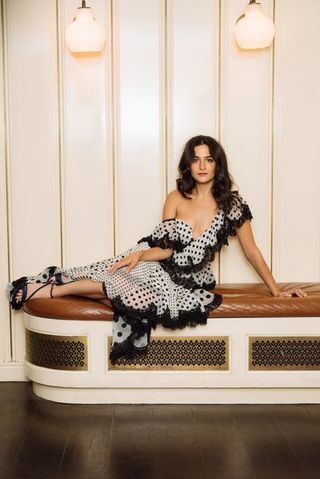
Zimmermann black and white polka dot dress, $3160, Barneys; Tibi satin heels, $450, Spring; Swati Dhanak silver hood folded earrings, $725, Swati Dhanak
Sometimes, Slate's penchant for working from instinct and breezily shooting from the hip pays off. Other times, not so much. When our waiter approaches, Slate asks him for free-range eggs and potato hash with turkey sausage on the side, and before he can turn away, she zeroes in on a large pewter ring on his finger. "Oh, I like your ring!" she exclaims as she reaches out to inspect the engraving on its front. "Is it Isis?" Our waiter looks a bit perplexed, and it takes Slate only half a beat to add, "...or Osiris?" The waiter says he doesn't know what the glyph means, just that he liked the way it looks. "It's an Egyptian god," says Slate. "I think it's Osiris."
After he leaves our table, Slate immediately leans in. "I literally just said 'ISIS.' You can't even say that word anymore, which is such a bummer." Then she adds, "Please don't make the headline that I asked the waiter if his ring is ISIS."
We return to talking about Landline, but Slate winces mid-sentence. "Is that Isis? Come on, Jenny, wake up."
Stay In The Know
Marie Claire email subscribers get intel on fashion and beauty trends, hot-off-the-press celebrity news, and more. Sign up here.
To a certain subset of pop culture acolytes, gabbing with Jenny Slate—who considers herself a "chatterbox"—ranks up there with going to get your hair blown out with Connie Britton. One can only dare to dream. Slate isn't interested in being impenetrable or a Hollywood cipher, and her warmth and genuine relatability draw in fans who see her as an imaginary celebrity bestie. But "chatterbox" doesn't do her justice. The word implies triviality; Slate is anything but.
An overachiever and high school valedictorian, Slate co-founded Columbia's improv team before forming a stand-up duo with classmate Gabe Liedman and staging a one-woman show on the side. Five years later, in 2009, she joined the cast of Saturday Night Live.

REDValentino shirt, $450, crop top, $295, and shorts, $395, ShopBop; Four Eyes Ceramics earrings, $75, Etsy
It did not go well: She famously let an F-bomb slip on her first episode. The incident, which made only minor waves in Studio 8H, became a permanent mark on her professional origin story. Her bigger obstacle: the notoriously competitive, high-pressure workplace, in which she felt herself wilt. "It was like I lost my confidence," she says. "I felt like I did in the seventh grade when I got bullied. I didn't believe in myself, I made myself a victim." She lasted one season.
I hate being quiet, and I hate being disregarded. I want to be truly seen.
The disappointment devastated her. But while she calls herself "really emotional, really sensitive," she's certainly not a wimp. "I'm fascinated by my own resilience," Slate says. "I think as women we have these wonderful things about ourselves that we're told to only look at out the side of our eye, to say, 'I know it's in the room, but if I hold hands with it and say I'm partnered with it, then I'm being full of myself.' But I hate being quiet, and I hate being disregarded. I want to be truly seen."
It was around this time that Slate and her boyfriend (and later, husband), filmmaker Dean Fleischer-Camp, made a little web video called Marcel the Shell with Shoes On. The charming stop-motion short about a tiny shell with a googly eye and a sharp POV got more than 28 million views. Slate and Fleischer-Camp followed it up with two more videos and a series of children's books.
Slate seems to have extracted an unusual amount of catharsis from that little shell. "That character was a real expression of what I feel," she says. "A feeling of being rather small, delicate, of not wanting to compare myself to the rest of the world—but wanting to be in it."
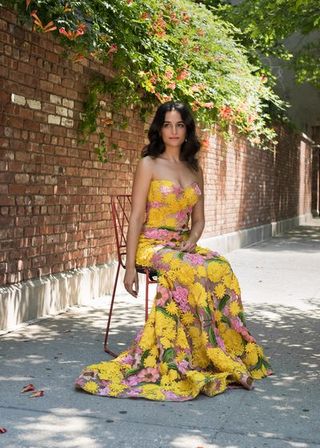
Naeem Khan floral gown, $11,995, Neiman Marcus; Agmes Earrings, $460, Barneys
You know what's weird about reality shows? Everything," Slate offers later on in our meal, in a characteristic non-sequitur. "A lot of the time, the ladies say to each other as an insult that they should go to therapy. Like, 'You really need help, honey. I wish you well. You need to go to therapy.' But every person needs to have someone to talk to. Therapy is beautiful." She runs through her therapists as if recounting her dating history: She started seeing her first after graduating from Columbia. That lasted about seven years, until Slate moved to Los Angeles. The second was a Freudian analyst who ghosted her...or maybe it was Slate who did the ghosting. "I went away to shoot three movies in a row, and we just sort of stopped," she says. "She never got back to me." (The latest is a Jungian, and they're very happy together.)
I'm not sure how to change without completely silencing myself.
Talk to Slate for long enough and you'll start to imagine that if therapy were an Olympic event, she'd be Michael Phelps—someone preternaturally, almost freakishly, suited to her sport. She's dialed into her emotions with impressive clarity. When she picks up a topic, she careens around it, examines it from all angles, and narrates her findings in real time. To wit: When we first sit down, a conversation about New York's crumbling subway system leads to a taxonomy of all the metropolitan indignities New Yorkers take pride in enduring, which leads to Slate venting her frustration over L.A.'s obsession with plastic-surgery-aided perfection: "It's saying, 'I've given up. I'm too afraid that imperfection is going to make me feel excluded from the community, so I'm buying in rather than opting out.' It plays into a deep fear put in place by the patriarchy. We live in a system in which our president can be the most heightened misogynist and chauvinist, who is always making it his business to comment on women's appearances. It's repulsive. But it also creates a culture of fear in which we think, Even if I don't want it to, my physicality is going to be called out, and I'm going to be vulnerable."
Maybe it's that skill for doggedly rooting out nuance that makes Slate such a compelling storyteller. Take her recent interview on the podcast Talk Easy with Sam Fragoso in which she recounted a first date from hell. (Spoiler: Dude showed up in full Renaissance Faire-grade shining-knight regalia. Slate stuck around long enough after the date to help him shimmy out of his chainmail in the parking lot.) It's as much an allegory for the way men trap women in supporting roles in male narratives as it is just a funny story about a really shitty date.

Zimmerman black and white polka dot dress, $3160, Barneys; Tibi satin heels, $450, Spring; Swati Dhanak silver hood folded earrings, $725, Swati Dhanak
The roles Slate chooses and the way she plays them follows from that attitude: They aren't all-or-nothing. They're complex, like real life. "I was afraid to play a peppy woman who also lies and cheats, because a lot of times when women do something bad, they're punished for any sort of joy they experience," she says of her role in Landline. "But joy is just joy. I wanted to play a complex person, so I had to say to myself, 'The audience's fear of what it's like to see a complex woman doesn't factor in to how I feel about playing one—or being one.'"
Slate's Twitter feed is a cocktail of confessional musings, self-affirmations, politics, and humor so perfectly calibrated that it should be bottled and sold to anyone who Googles "authenticity." But don't let it fool you: Outside of Twitter, Slate is leery of social media, the internet, even computers. Last year, she published a book with her father about her childhood house in Massachusetts without ever venturing to purchase or install Microsoft Word. (She sent everything to her editor via email.) She recently went to Norway and spent a day freezing in a drafty AirBnB before her friend Becky asked why she didn't turn the space heater on. "I looked, and I was like, 'Oh my God, I thought that was a computer!' If I think something is a computer, I just don't deal with it."
Divorce moves at the speed of complete deadening silence, or that's how it feels.
Earlier this year, she learned a hard lesson in how quickly information can get fragmented online. To promote Gifted, a movie she starred in alongside her ex-boyfriend Chris Evans, Slate gave an intimate interview to New York Magazine, speaking frankly and extensively about her relationship with Evans, whom she'd dated for nine months shortly after separating from Fleischer-Camp in 2016. Unlike more reserved actors, who speak about their personal lives in vague, anodyne platitudes, Slate openly intertwined stories of her personal life with her professional life because, well, they were intertwined.
The interview went viral, and for the first time, Slate found herself caught up in the online gossip machine. "It seems so naïve: You're just talking to a nice person, and you have a really honest, beautiful conversation, and she writes about it in an honest, beautiful way," Slate says. "But then, it goes through all these other outlets and gets distilled. And then it can be made to seem like you were being cheap.…I didn't mean to do that. Especially not with an experience that was so precious to me."
As she rises onto the tabloid radar, Slate finds herself grappling with the high-speed, voracious nature of celebrity culture. "There's so much more teeth out there, so many invisible claws out on the internet. It's one thing to be, like, Cloris Leachman in 1979, saying, 'I fucked Gene Hackman,' or whatever—that's only going to be in one article, and if people want to find it, they're going to have to go to the library and use the microfiche," she says. "But I enjoy putting myself out there much more than I fear the consequences. I do have to learn to make sure that I'm taking that risk alone, and not dragging anyone else into it."

Altuzarra silk dress, $1,495, Barneys; Orseund Iris bustier, $230, Spring; Four Eyes Ceramics earrings, $65, Etsy
If the story put any strain on Slate and Evans' post-relationship relationship, it didn't look like it when they met again on the Gifted premiere red carpet. In fact, a casual observer would think that Slate walks away from all her personal and professional splits amicably: She speaks glowingly of Evans (though these days she's careful not to use his name when talking to a reporter); she still wells up when she tells the story of being told she was cast on SNL, refusing to let the "disappointment" of her ouster make her resentful; and she still remains friends and collaborators with ex-husband Fleisher-Camp. (The two share custody of Marcel and are currently developing a feature-length Marcel movie together.) When I half-jokingly ask Slate if she's somehow the world's best breaker-upper, she grimaces.
"A divorce moves at the speed of complete deadening silence, or that's how it feels. When we got divorced, I felt like I was in outer space," she says. "But I think we at least had the foresight, even amidst all that pain, to say, 'If we don't do this now, we will never be able to be together at all in any way. We will never be able to work together or be friends.'" Slate says she's definitely had bad breakups—"Believe me, I have those ex-boyfriends too, where I'm like, 'Goodbye.' With a period between 'good' and 'bye'"—but that she's not one to jettison the meaningful relationships in her life. "Just because something didn't work out in its original form doesn't mean you have to denigrate it and say it was worth nothing," she says.
Slate steps away from the table and returns a few minutes later, slumping into her seat, visibly more tentative than she was moments ago. "You know, I was in the bathroom thinking, 'I did it again.' I overspoke," she says, her eyes scanning the now-empty tabletop. "I feel so compelled to give a detailed answer to everything. People tell me over and over, 'Jenny, you don't have to say everything.' But I forget. I straight-up forget, and I'm not sure how to change without completely silencing myself."
As we grab the check, the conversation turns back to Landline. The movie doesn't offer easy answers, and none of the characters' storylines are wrapped up neatly at the end. The family comes together after having laid their flaws bare, clearly seeing one another for the first time. They're on the cusp of a breakthrough—one that might happen after the credits roll. And that, in a nutshell, is Slate: "There's always potential."
Photography by Katie McCurdy
Styling by Haley Lowenthal
Hair by Nikki Providence
Makeup by Kirin Bhatty
Special Thanks to The Standard, East Village
Nojan Aminosharei is the Entertainment Director of Men's Health and Women's Health, and the Digital Entertainment Director of Harper's Bazaar. He was previously the Entertainment Director of Hearst Digital Media, and before that a Senior Editor at GQ. Raised in Vancouver, Canada, Nojan graduated from NYU with a master’s degree in magazine journalism. The late Elaine Stritch once told him, "What the fuck kind of name is Nojan? I'm 89 years old, I don't have time for that shit.
-
 Celebrate Earth Month With Our Feel-Good Fashion Report
Celebrate Earth Month With Our Feel-Good Fashion ReportYour guide to being more sustainable in 2024.
By Anneliese Henderson Published
-
 Anne Hathaway Details the "Gross" Audition Request She Once Endured
Anne Hathaway Details the "Gross" Audition Request She Once Endured"Now we know better."
By Meghan De Maria Published
-
 The Emotional Ending of 'Baby Reindeer,' Explained
The Emotional Ending of 'Baby Reindeer,' ExplainedNetflix's latest miniseries from Richard Gadd is based on the true story of the comedian and his stalker.
By Quinci LeGardye Published
-
 How Timothée Chalamet's "Emotional Intelligence" Will Transform the Character of Willy Wonka
How Timothée Chalamet's "Emotional Intelligence" Will Transform the Character of Willy WonkaLiterally perfect casting.
By Iris Goldsztajn Published
-
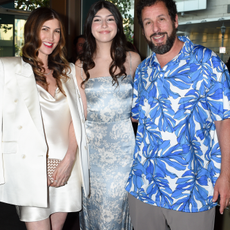 Adam Sandler Brought His Wife Jackie and Lookalike Daughter Sunny to 'The Out-Laws' Premiere
Adam Sandler Brought His Wife Jackie and Lookalike Daughter Sunny to 'The Out-Laws' PremiereSo cute!
By Iris Goldsztajn Published
-
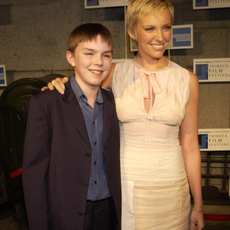 Nicholas Hoult Told Toni Collette He Still Thinks of Her as His Mom When He Watches One of Her Movies
Nicholas Hoult Told Toni Collette He Still Thinks of Her as His Mom When He Watches One of Her MoviesI love this so much.
By Iris Goldsztajn Published
-
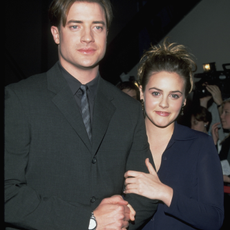 Alicia Silverstone Would Totally Do a Sequel to The '90s Rom-Com She Starred In Opposite Brendan Fraser
Alicia Silverstone Would Totally Do a Sequel to The '90s Rom-Com She Starred In Opposite Brendan FraserDid you guys know about this movie??
By Iris Goldsztajn Published
-
 Jennifer Grey Spotted Someone Watching 'Dirty Dancing' on a Plane on Valentine's Day
Jennifer Grey Spotted Someone Watching 'Dirty Dancing' on a Plane on Valentine's DayFact: This is the best thing that's ever happened.
By Iris Goldsztajn Published
-
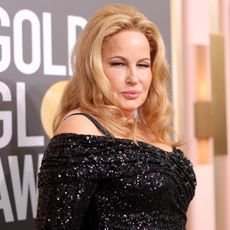 Jennifer Coolidge Would Definitely Be "On Board" to Film 'Legally Blonde 3'
Jennifer Coolidge Would Definitely Be "On Board" to Film 'Legally Blonde 3'YES!!!
By Iris Goldsztajn Published
-
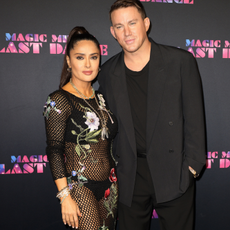 Salma Hayek Says Channing Tatum Almost "Killed" Her During a Lap Dance for 'Magic Mike's Last Dance'
Salma Hayek Says Channing Tatum Almost "Killed" Her During a Lap Dance for 'Magic Mike's Last Dance'LOL, Salma.
By Iris Goldsztajn Published
-
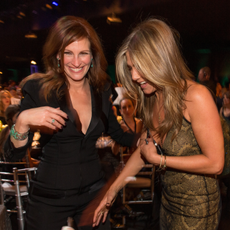 Julia Roberts and Jennifer Aniston Are Body-Swapping in an Upcoming Comedy, And It Might Be the Best News I've Ever Received
Julia Roberts and Jennifer Aniston Are Body-Swapping in an Upcoming Comedy, And It Might Be the Best News I've Ever ReceivedClearly, I've lived an uneventful life.
By Iris Goldsztajn Published